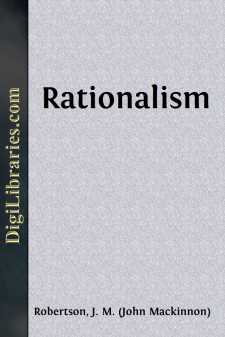Categories
- Antiques & Collectibles 13
- Architecture 36
- Art 48
- Bibles 22
- Biography & Autobiography 813
- Body, Mind & Spirit 142
- Business & Economics 28
- Children's Books 15
- Children's Fiction 12
- Computers 4
- Cooking 94
- Crafts & Hobbies 4
- Drama 346
- Education 46
- Family & Relationships 57
- Fiction 11828
- Games 19
- Gardening 17
- Health & Fitness 34
- History 1377
- House & Home 1
- Humor 147
- Juvenile Fiction 1873
- Juvenile Nonfiction 202
- Language Arts & Disciplines 88
- Law 16
- Literary Collections 686
- Literary Criticism 179
- Mathematics 13
- Medical 41
- Music 40
- Nature 179
- Non-Classifiable 1768
- Performing Arts 7
- Periodicals 1453
- Philosophy 64
- Photography 2
- Poetry 896
- Political Science 203
- Psychology 42
- Reference 154
- Religion 513
- Science 126
- Self-Help 84
- Social Science 81
- Sports & Recreation 34
- Study Aids 3
- Technology & Engineering 59
- Transportation 23
- Travel 463
- True Crime 29
Rationalism
Description:
Excerpt
§ 1. THE TERM
The names ‘rationalist’ and ‘rationalism’ have been used in so many senses within the past three hundred years that they cannot be said to stand quite definitely for any type or school of philosophic thought. For Bacon, a ‘rationalist’ or rationalis was a physician with a priori views of disease and bodily function; and the Aristotelian humanists of the Helmstadt school were named rationalistas about the same period by their opponents. A little later some Continental scholars applied the name to the Socinians and deists; and later still it designated, in Britain, types of Christian thinkers who sought to give a relatively reasoned form to articles of the current creed which had generally been propounded as mysteries to be taken on faith. The claim to apply ‘reason’ in such matters was by many orthodox persons regarded as in itself impious, while others derided the adoption of the title of ‘rationalist’ or ‘reasonist’ by professing Christians as an unwarranted pretence of superior reasonableness. Used in ethics, the label ‘rationalism’ served in the earlier part of the eighteenth century to stigmatise, as lacking in evangelical faith, those Christians who sought to make their moral philosophy quadrate with that of ‘natural religion.’ Later in the century, though in England we find the status of ‘rational’ claimed for orthodox belief in miracles and prophecies as the only valid evidence for Christianity, rationalism became the recognised name for the critical methods of the liberal German theologians who sought to reduce the supernatural episodes of the Scriptures to the status of natural events misunderstood; and several professed histories of modern ‘rationalism’ have accordingly dealt mainly or wholly with the developments of Biblical criticism in Germany.
New connotations, however, began to accrue to the terms in virtue of the philosophical procedure of Kant’s Critique of Pure Reason, though his Religion within the Bounds of Simple [blossen] Reason went far to countenance the current usage; and when Hegel subsequently proceeded to identify (at times) reason with the cosmic process, there were set up implications which still give various technical significances to ‘rationalism’ in some academic circles. In the brilliant work of Professor William James on Pragmatism, for instance, the term is represented as connoting, in contrast to the thinking of ‘tough-minded’ empiricists, that of a type or school of ‘tender-minded’ people who are collectively—
‘Rationalistic (going by “principles”)
Intellectualistic
Idealistic
Optimistic
Religious
Free-willist
Monistic
Dogmatical.’
Yet it is safe to say that in Britain, for a generation back, the name has carried to the general mind only two or three of the connotations in Professor James’s list, and much more nearly coincides with his contrary list characterising ‘the tough-minded’:—
‘Empiricist (going by “facts”)
Sensationalistic
Materialistic
Pessimistic
Irreligious
Fatalistic
Pluralistic
Skeptical’
—though here again the item ‘pluralistic’ does not chime with the common conception, and ‘pessimistic’ is hardly less open to challenge....



